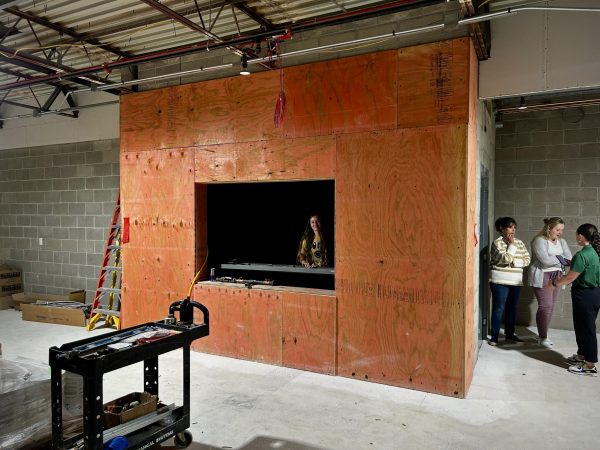The Effect of Plant Based Diets
I just didn’t want to be an inconvenience.
— Sidney Tranel ՚25
Food has always been a prime example of the diversity of cultures. People can find and experiment in both their identity and community. The United States, being a multicultural country, exemplifies both the variety, and the shared culture of residents. Mainstream American diets have continued to receive criticisms on the health and sustainability of them, but popular food trends are far from being over.
McDonalds, the number one fast food chain in the world. An often accepted symbol of the “American diet”.“Over 99 billion sold,” a sign could say, commenting on the total burgers produced for consumers. Serving Big Macs, McChickens, and Filet o Fishes, McDonalds sells all kinds of meats. But for some, the “normal” means they’d never touch one of these foods.
“Plant based diet” is an overarching term solely meaning that a person is actively trying to get most of their nutrients from plant sources. Plant based diets can come in all forms; from eating occasional meat, poultry or fish as a flexitarian, or not eating any eggs or dairy products as a vegan. Plant based diets have room for everyone to find their right fit ranging from adding more plants to their meals, to being pescatarian by eating only foods from plants with the exception of fish.
Tranel identified as vegetarian for the last two years. She began due to the recommendation of a friend, and continued throughout the pandemic. But, due to worries about nutrition, and the accessibility of following a plant based diet, she recently implemented chicken into her diet.
“Being in online school I would cook all the time. I cooked my own breakfast, lunch, dinner; I was very into cooking and like when you’re really into cooking, it is a lot easier to be vegetarian,” Tranel said.
Despite Tranel’s desire to be fully plant based, many teenagers’ lives can’t fully commit to one more factor weighing on their brains.
“I think if our society was more structured around plant based diets and had more options, it would be much easier,” Tranel said. “When you go to a fast food restaurant, or picking up dinner, there’s usually one or two vegetarian options and especially if you’re picky like me, sometimes you’re like, that’s disgusting. It’s hard to find stuff. Our society is so based around meat, it’s just kind of hard to find good options and substitutes if you’re a teen who doesn’t have time for anything.”
Despite the increase in awareness, popularity and understanding of plant based diets, people with dietary restrictions have difficulty finding foods when they go out to eat. Ordering at restaurants can often be tricky for people following plant based diets; trying to figure out if they want to eat something and then additionally if they can eat it. People following less restrictive diets may want to alter theirs to be more specific, but it adds one more layer to being mindful of what they’re eating.
“If there’s two vegetarian options, there’s one vegan option. It makes it harder to make meals like pasta, milk eggs, all of that stuff,” said Tranel. “Like that’s a component for so many like vegetarian meals. Especially being an athlete, [being vegan] would be so hard to get protein.
In addition to more widespread culture, smaller circles have a huge impact on what we are able, and want, to eat.
“I’ve been vegetarian for so long that it’d be weird for me to start eating [meat] now.” said Kamakshee Kuchal, ՚24.
Kuchal has been vegetarian for her whole life. Her whole family follows plant based diets, both vegetarian and vegan. Despite her family all following these diets, the culture of our society still makes an impact on their food choices.
“My brother is currently vegetarian, but my mom wants to persuade him to be vegan. But the school culture around him, like other kids drinking milk and him wanting to fit in [makes it difficult].” said Kuchal .
People of all ages want to fit in. To find shared experiences, ideals, and aspirations. Food can bring people together, but at the same time it has the potential to isolate others.
“I will admit that there have been times where my friends have made jokes about meat…. They’ll hold up meat and say “does this make you uncomfortable” and I would say “no why would you ask that” or they’ll say “why don’t you just try it?”. Some people just invalidate [my diet],” said Kuchal.
Mia Thompson ՚24, has encountered similar influence because of het diet.
“I’ve felt judged and I think sometimes it may be enough to pressure someone out of being vegetarian. For example someone who has a really avid meat eating and hunting family may struggle with food options and always being offered meat. But I think if you have a passionate enough reason to be vegetarian it’s easy to not care what others think and stick with it.” said Thompson.
Determining a reason for following any diet can be difficult regardless of what that diet entails. Many people have hesitancy about following a plant-based diet especially regarding protein intake, but there are other foods that provide plenty of protein. Healthy adults should be consuming .36 grams of protein for every pound of their body weight daily.
“I usually get [my protein from lentils and nuts]. I’ve been worried about my protein intake a lot. I know meat has a lot of protein. And you need a lot of protein to function. I’ve been trying to look for substitutes but there really aren’t that many,” said Kuchal.
Plant based diets have been thoroughly researched, finding many benefits such as boosting one’s immune system, increasing fiber, and even reducing disease risk. High fiber intake lowers cholesterol and stabilizes blood sugar. Additionally, organic foods contain nutrients and antioxidants that are essential to cellular health.
Even though plant based diets can help reduce disease and other health concerns, it is also important to make sure that other essential vitamins and minerals aren’t lessening. If following a plant based diet, the following are some to make sure of balancing:
- Vitamin B12
- Calcium
- Iron
- Zinc
- Vitamin D
- Omega-3 fatty acids
After adding small amounts of chicken back into her diet, Tranel felt noticeable changes. “I felt fuller. Like I haven’t really craved snacks as much and I felt less tired during the day,” Tranel said.
An innovation trying to replicate the protein that many get from animal products, are meat substitutes such as the Impossible burger. Many people are hesitant to try what they consider “fake meat”, but others are more open to the idea.
“[I’ve tried] veggie burgers, Impossible meats, all of that. And I say, most of it’s pretty good. I found some good impossible burgers that taste basically the same,” said Tranel.
Finding a way to alter their diet while still maintaining the culture of their communities is often a skill people participating in a plant based diet hone.
“My go-to vegetarian meal is either a beef or black bean burger,” said Thompson. “It may sound hard when it comes to a place like McDonalds but I usually would get something like a smoothie and fries.”
Other times, it’s out of their control what options they have, and new arrangements are needed.
“I went to this event and the coordinator had to spend her own money because there weren’t any vegetarian options. And I was the only vegetarian there, so I felt singled out,” said Kuchal.
Common reasons for being plant based are related to sustainability; whether that is environment, health, etc. Regardless, sometimes following the diet itself isn’t sustainable. Each person is different, and in relation to what they are eating, everyone needs something different.
“Research it, think through your reasons. If it’s going to be beneficial to you. Think of if you’ll be able to maintain it, how it’s going to affect you, like if you’re a sport take that into consideration,” said Tranel.
In addition to food consumption needs, everyone’s culture varies. Who, where and why all play a role in the development of diet. People who have only known one diet their whole life, may struggle to embrace a sudden change.
“If I were born in a family that wasn’t vegetarian I would not be convinced by anyone else to convert to be vegetarian, because you’re just so comfortable with where you are,” said Kuchal. “If you want to try it, there are a lot of health benefits to it, but it’s your choice to make.”
These choices are flexible and don’t need to be concrete. Each experience will vary, and deciding whether or not to continue following a diet doesn’t have to be a fixed decision.
“I would [recommend] just be plant based when you can,” said Tranel. “When I was strictly vegetarian, the thought of eating meat I was like, ‘Oh my god, I’m gonna break my streak, I’m not vegetarian anymore.” You have to be kind of lenient with it. If you eat meat once a month, or once a week, you can still say your plant based.”
Any diet that deviates from the mainstream diet can be hard to maintain for some, but for others, it would be harder to change what they eat to fit the “normal”.
“I have definitely had my moments where I was, maybe i’ll try [meat] one day in the future,” said Kuchal. “I would like to see what it’s like just to experience it. But as of right now, being vegetarian is what I think my entire future will be. It’s something I can depend on.”
Your donation will support the student journalists of West High School. Your contribution will allow us to purchase Scholarship Yearbooks, newsroom equipment and cover our annual website hosting costs.

(she/her) Marie Stier is a Junior at West High and she is excited for her second year on staff. She is the Feature Editor for WSS. In her free time, you...












